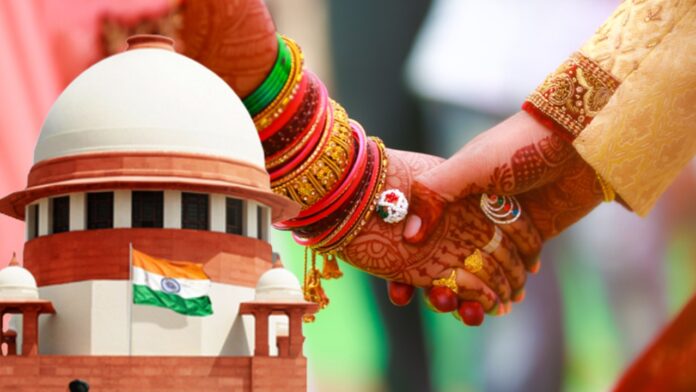The Supreme Court turned down a petition by BJP politician and lawyer Ashwini Kumar Upadhyay calling for a standard marriage age for both gender. The minimum age for marriage under current law is 18 years for women and 21 years for males, respectively. According to the court, it is the government’s responsibility, not ours, to make laws. In her argument, Ashwini Kumar Upadhyay claimed that the current legal system, which permits girls to get married at the age of 18 and boys at the age of 21, reinforces the gender inequity that already exists in marriage.
Although the petitioner requests that the age of marriage be raised to 21 for both men and women, a bench consisting of the Chief Justice of India (CJI), DY Chandrachud, and Justices PS Narasimha and JB Pardiwala noted that the plea’s main request was to have the provision defining the minimum age of marriage completely overturned.
“There will be no minimum age for marriage for women if the provision establishing the 18-year-old requirement is simply struck down. It is common knowledge that under Article 32, this court cannot order the legislature to pass laws and cannot pass laws itself “The Court made a point. The assertions made by Upadhyay, in which he claimed that the High Court will then resolve the case, also infuriated the Court.”We don’t want your unwarranted criticism of us. We are not here to appease you or any certain political group. Keep your comments to a minimum. This is not a place for politics. We owe you no justification, “CJI made a comment.
In the petition, it was said. Women can get married at the age of 18, however men can only do so when they are 21. The distinction is made using patriarchal prejudices that are not supported by science. De jure and de facto discrimination against women is totally counter to the global trend. According to Upadhyay, certain religiously based laws that set a minimum marriage age are discriminatory under Articles 14 and 21. In order to comply with the spirit of Articles 14, 15, and 21 as well as international conventions, the top court was urged to order the Central government to take the necessary actions to eliminate any anomalies in the Minimum Age of Marriage and to make it “gender neutral, religion neutral, and uniform for all Citizens.”
Upadhyay also filed a transfer petition in an effort to stop the proliferation of lawsuits and divergent viewpoints. He had asked for the transfer of petitions pending before the Delhi and Rajasthan courts on this subject. But, the Court declared today that the matter was within the purview of the parliament and that it had to be referred to that body’s final judgment. “The Parliament may also do that; we are not the only ones who have custody of the Constitution. In addition, Parliament has the authority to: “Bench made a comment. As a result, the Court declined to consider the argument. “Thus, we decide not to take part in this petition. You can use the same remedies that the petitioner has access to.”






